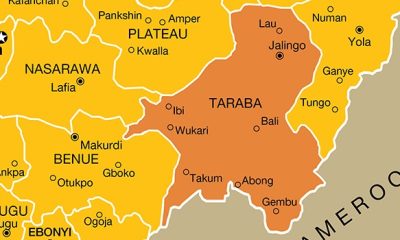News
FG, Tarab Gov’t sign MoU on skills development, job creation

Federal Government and the Taraba Government on Wednesday, signed a Memorandum of Understanding (MoU) to operationalise FG’s Skills Upgrading and Vocational Training Centre (SUVTC), for job creation and poverty reduction in Taraba.
The Minister of Labour and Employment, Mr Simon Lalong, said during the event in Abuja, that the MoU would operationalise the SUVTC, located at Ibi, Ibi Local Government Area of the state.
Lalong congratulated the state government for keying into the vision of President Bola Tinubu on job creation and poverty reduction, through skills development.
He commended Gov. Agbu Kefas of Taraba for taking the bold step to stem unemployment and encouraged other states to key in.
He assured the government of the ministry’s continued support to strengthen skills development in the state.
“President Tinubu has said that he wants to take our youths out of the streets and by God’s grace, we will take people off the streets,” the minister said.
Earlier, the Minister of State in the ministry, Mrs Nkeiruka Onyejeocha, said that the SUVTC was designed to equip Nigerians with relevant skills.
This, Onyejeocha said, would create employment opportunities for Nigerian youths, adding that certificate was simply not enough.
“I am encouraging graduates to upgrade their skills because certificates may not work but skill will keep you going,” she said.
Also, Mrs Juliana Adebambo, the acting Permanent Secretary in the ministry, said that Borno government had completed a similar process, adding that the skills centre at Konduga was fully operational.
Adebambo equally said that Kano, Kaduna, and Edo state governments had also shown interest in the initiative.
According to her, establishment of skills centres, particularly in rural areas will significantly help in curbing the menace of unemployment and youth restiveness.
On his part, Gov. Kefas, who was represented by Mr Habu Phillips, Commissioner, Ministry of Cooperative and Poverty Alleviation, commended the federal government for the partnership.
He expressed optimism that the MoU would help significantly in creating jobs to address the problem of unemployment in the state.
This, according to him, is in line with the renewed hope agenda of President Tinubu and the moving agenda of Taraba government.
He explained that based on the MoU, Taraba government would take over the management of the centre for the benefit of all residents of the state.
The governor said that the government would train between 5,000 and 7,000 women and youths on different skills in the next three years.
“We have put in place proactive measures and effective monitoring and evaluation mechanisms to ensure the smooth running of the centre to achieve desired results,” he aid.
He urged the federal government to build more skill centres across the state to increase access.
News
Woman killed while crossing road in Anambra

The Federal Road Safety Corps (FRSC), Anambra State Sector Command, has confirmed the death of a woman in an accident at Okpoko Market on the Asaba-Onitsha Road.
The Sector Commander, Mr Adeoye Irelewuyi, who confirmed the accident to journalists in Awka on Thursday, said that the woman was hit while she was crossing the road.
He said that the accident, which occurred on Wednesday, involved a commercial tow truck with registration number XA550BMA.
“Eyewitness report reaching us indicates that the truck was towing a vehicle in an uncontrollable speed along the axis.
“The vehicle that was being towed got detached from the tow truck.
“It hit and killed a female adult, who was said to be crossing the road, while the tow truck continued its movement.
“FRSC rescue team came to the scene and took the woman to Toronto Hospital, Onitsha, where she was confirmed dead and her body deposited at the hospital’s mortuary,” he said.
While sympathising with the family of the dead, the sector commander urged motorists, especially tow truck drivers, to exercise a high level of professionalism.
He also urged the drivers to always use standard equipment and avoid speeding.
News
LASG’s maize palliative impactful, says poultry association chair

The Chairman, Poultry Association of Nigeria (PAN), Lagos State Chapter, Mr Mojeed Iyiola, said the state government’s maize palliative to members of the association made a positive impact on the sector.
Iyiola said this in an interview with the News Agency of Nigeria (NAN) on Thursday in Lagos.
“We received about 150,000 tons of maize in February from the Lagos State government as palliative to cushion the effect of high feed prices.
“The major benefit of the palliative is that it actually cushioned the cost of production for most poultry farmers in the state.
“The palliative was beneficial as it made the cost of some poultry produce, especially eggs to drop,” Iyiola said.
He noted that prior to the palliative, a crate of egg was sold between N3,500 and N3,700 at the farm gate, but after the palliative, it now sells between N3,200 and N3,400.
According to the PAN chair, retailers and middlemen who sell from N3,800 to N4,200 do that for their personal gain.
“We have urged our members to sell their eggs at reasonable prices following the receipt of the palliative from the government.
“We appreciate the Lagos State government for the palliative but we also urge the federal government to do likewise, to further reduce the cost of production in the sector.
“This will consequently lead to drop in the prices of all poultry produce across board,” he said.
He said the palliative was shared among financial members of the association at no extra cost.
“As an association we shared the grains equally across PAN’s eight zones in the state equally. We also mandated each zone not the sell even a grain of the maize.
“We, however, considered new poultry farmers who wanted to the join the association as beneficiaries of the palliative,” said Iyiola.
He noted that through the palliative, more poultry farmers were recruited into the association.
“The maize was shared only to poultry farmers and not feed millers, it is the major component of poultry feed formulation,” he said.
















